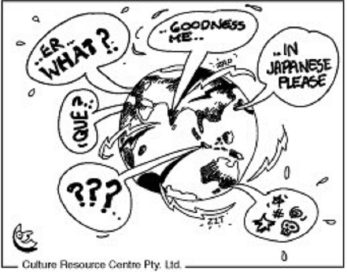Blog Culture@Work
Welcome! My name is Joost Thissen and here I like to share cultural columns and insights for those of us who are interested in culturally diverse and global workplaces.


Welcome! My name is Joost Thissen and here I like to share cultural columns and insights for those of us who are interested in culturally diverse and global workplaces.


cultural column  Email This Post
Email This Post
A while ago I was talking to a Sales Manager about cultural differences while doing business in Asia. He was quite surprised to hear that some organisations invest in training or coaching before their managers and professionals embark on overseas business trips or expat assignments. “Before our conversation” he said, “I never realised that this topic has been a management discipline for over 40 years”.
“On further consideration”, he said, “it might be smart for some people out there…”. He smiled and said convincingly that he loves to travel in Asia and the food was simply delicious. He commented about Korea and its extremely friendly people: “don’t you just love kimchee?”, Japan and the beautiful Ginza Avenue: “I always eat too much sashimi”, Hong Kong and it’s floating restaurants: “I could kill for their dim sum”, and of course Malaysia and a stopover at Penang beach: “I like the Penang laksa better, what do think?” But best of all was Singapore food paradise: “Drunken prawns, simply delicious”. He had obviously been around and loved his food.
When I asked him if he closed as many deals in Asia as he did in for example back home in Australia, he shrugged and said that he did not really compare business successes across countries: “every situation is different”. When I pressed a bit more, he was quiet for a moment and then said with a surprised look on his face… “You know I really loved the food, the travelling, the 5*hotels, and the people. But I just realised that although I was awfully to close deals sometimes, I was never actually that successful in Asia”.
Let us have a look at what people might encounter when they travel overseas and especially the likelihood of experiencing any form of ‘culture shock’:
a sense of confusion, anxiety, or depression, that results from being cut off from your familiar environment and norms when being in a foreign country.
Depending on the time people spend in an other country, the familiarity with the new culture and the intensity of contacts with locals, culture shock might take on different forms from very mild to severe impact.
Simply categorised 3 types of international managers can be distinguished:
1. the manager who travels for a only a few days to a country;
2. the manager who spends a few months in a specific country; and
3. the manager who actually lives and works for a few years in a country.
Our Sales Manager belongs to the first group. During his business trips he only ‘touches down’ for a short period of time: a couple of days in Singapore, flight to Japan and the return trip via Shanghai, and sometimes an ‘overnighter’ in South Korea.
This manager will most likely never get out of the first phase of culture shock: ‘The honeymoon phase‘ (1) in which everything is exciting and interesting. There might be the expectation that the travel-happiness lasts forever… The problem in this phase might be that you are more focused on yourself and your tasks, and that you are pretty oblvious to your cultural different surroundings. Before you know it, you are safely back home. And although this time around the trip was not yet successful, you bring home the best food stories without realising that you did not understand that much of the local people you met.
The moment however, that people stay in a country for a longer period as e.g., being part of an international project or have an expatriate position – people go through a few more culture shock phases.
Straight after the honeymoon follows ‘The morning after‘ phase, or more formally known as ‘The frustration phase‘ (2). Some people experience a feeling of fatigue or loss, and some go through strong emotions such as annoyance, irritation, and hostility.
When they manage to come out of the frustration phase, they realise and accept that the new country’s business behaviour is different from their own. It is called ‘The adjustment phase’ (3). People begin to become familiar with their surroundings. They are also more comfortable with the people and culture.
This usually means that these people have had to dig deep between phase 2 and 3 to recognise and understand the different behaviours, practices and values.
If they succeed to accept and adapt to the new culture, they have entered the ‘Happily ever after’ or ‘The adaptation phase‘ (4): by this time most of people will now be committed, creative, and taking risks again.
I invited the Sales Manager to one of our intercultural open course workshops. He confessed afterwards that only now he realised that he had not understood much about doing business with people in Asia. He also reflected that actually lacking the experience of culture shock due to his short-term stays, he had been rather oblivious to the actual cultural differences. The manager also listed the ‘classic’ mistakes such as dealing with power holders and status, relationships and losing face, level of directness in communication, and he even practised the infamous “yes is (not) a yes” misunderstanding while he kept waiting for the signing of a contract meeting… that never arrived.
Liking the food, the travel, the hotels, and the people does help you feel more comfortable. It does however not help you to understand what drives people of different cultures, and why they behave the way they do to reach their goals.
The Sales Manager was convinced that his accidental mistakes and misinterpretations had prevented him from being more successful in closing deals in Asia: he seemed the Sales Manager who got stuck in the honeymoon phase.
And that is exactly why culture shock could be a good thing: being challenged to become culturally knowledgeable about the differences. Developing the cultural competence to overcome the cultural barriers can save you a lot of time, money and – most likely – ‘face’. This will very likely increase the level of business success and ultimately the bottom line.
_________________________________________
Joost Thissen, Partner & Interculturalist
joost@cultureresourcecentre.com.au
cultural column  Email This Post
Email This Post